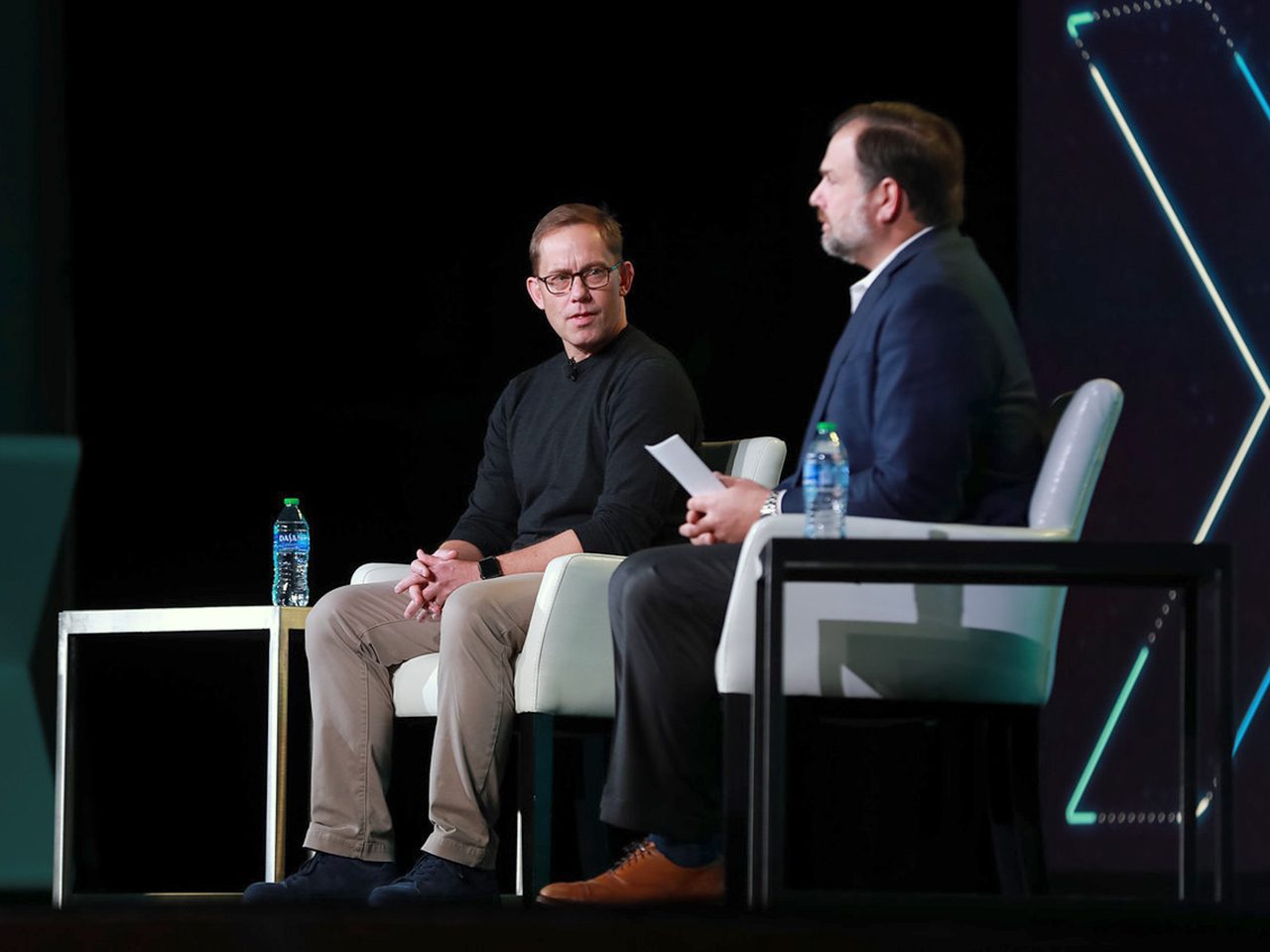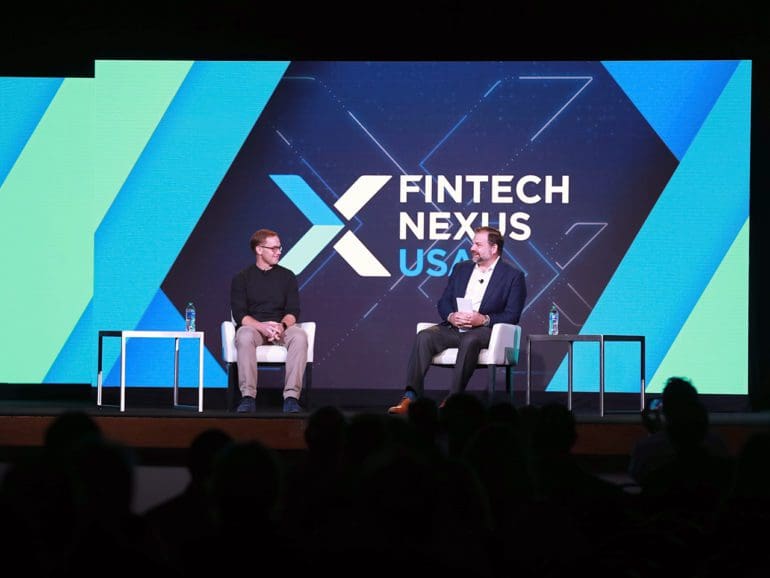Chime has come a long way since its founding a decade ago, but co-founder Chris Britt said the company is only getting started.
Britt was a keynote speaker at Fintech Nexus 2022, which was recently held in New York City on May 25 and 26. He was interviewed by Paul Stamas from General Atlantic (Stamas is a shareholder in Chime).
Chime’s early vision of a broad marketplace need
Fortunate timing is one ingredient in Chime’s success story. Founded in the wake of the financial crisis by Britt and Ryan King, the company could be positioned as an alternative to larger institutions whose bad practices were being exposed.
“We saw a great opportunity to provide a better, more aligned way for people to manage their finances,” Britt said. “From the earliest days, we knew that we didn’t want to just target the lowest income consumers, but the need was much broader. That’s the opportunity that we pursued to create a financial experience and a suite of products that were truly aligned with our members’ best interests in an authentic way.”
Hitting the mark with a new business model
Britt sees the need for better banking as universal. While Chime’s original appeal mainly was to younger segments, it has expanded to include people with incomes up to $100,000. The reason is that traditional banks aren’t focused on them.
He explained that the top 20-30% of wage earners are desirable because of their large deposits and prime or super-prime status. Banks chase after them. Others are not a priority.
“If you’re in the rest of the population, and you don’t have a particularly large deposit amount, and maybe you’re just getting started in your career, you don’t have a great credit score just yet,” Britt said. “The reality is that the way that traditional institutions go to market against that segment, because they don’t have big deposits, and because they’re not creditworthy, the way they monetize them is through a very punitive fee structure.”
Chime upended the traditional business model, Britt said. Many assume the only way to make it is through heavy lending or charging high fees. Chime’s model fosters deep, primary account relationships with millions of customers who receive direct deposits into their accounts.
The importance of establishing a primary relationship
A key point, one which Britt revisited throughout the discussion, was that those funds are used for everyday transactions. Chime earns a small fee from Visa when the card is used online or at the point of sale. Significant scaling with an in-house tech stack allows Chime to maintain a low-cost structure. Banks and their legacy technologies cannot duplicate it.
Britt said that continued success revolves around solidifying that primary financial relationship with customers and that it is only achievable if you know your customer. Most (70%) essentially live paycheck to paycheck. Make their lives more accessible, and you forge those ties.
Providing responsive products
Begin by helping them with short-term liquidity. Chime’s checking account is FDIC-insured and offers the usual protections. They provide fee-free checking and allow people to access their pay up to two days early. Those on direct deposit can go fee-free up to $200 into overdraft.
Britt said the next success was the Chime Credit Builder Secured Visa Credit Card. There is no credit check, and no annual fee or interest is charged. Users can take all or a portion of a deposit and place it in a separate account which secures a line of credit on a new account.
“People can run up a balance that’s equal to or less than the amount that’s been set aside,” Britt explained. “Because we’ve already set it aside, you have no chance of not being able to pay it back.
“We can always successfully report a payment off of this credit balance. We don’t charge a fee; we’re not trying to charge some fee structure or interest payment on that. And it has the effect of improving our members’ credit scores on average by 30 to 40 points.”
Britt added that the newest offering is a P2P product driving growth and engagement. Through its SpotMe service, Chime provides customers up to $200 in overdraft protection without fees. People can also “spot” others to be social, with some making new friends through the practice. Chime will continue to develop products and features that drive engagement, social connection, and virality.

A unique operating structure
Britt also discussed Chime’s operating structure, stating that Chime is not a bank but a consumer technology company. They work with partner banks and have regular contact with them.
Expect regulation and design your products and services around that, Britt advised. While companies can push for a certain regulatory direction, they should expect sensible regulation of some type.
Respect the rules and expect the regulatory reviews: Design KYC and AML practices in concert with your partner banks. In Chime’s case, many of these procedures exceed legal requirements.
Because its business model is not based on lending, Britt said that Chime does not need significant deposit volume. While that may be considered in the future, it may necessitate having its own charter. For now, they will continue earning small transaction fees when the card is deployed.
To be, or not to be (a bank)?
Did Chime consider becoming a bank at the beginning? Britt said some companies took that route, but the partnership model works fine at Chime. Partners like Chime’s ability to attract customers.
“I like to think that we’re playing a constructive role in terms of the overall banking industry,” Britt said. “We’re helping a handful of banks that are having an extremely difficult time competing against the top four or five banks in America, which continue to just get bigger and bigger and are just sucking the oxygen out of the room. (They) have technology budgets that are actually difficult to comprehend. So how are small mid-sized banks going to compete with that? We think we can be a partner to these guys, and so far, they’ve really appreciated it.”
Pandemic lessons
The COVID-19 pandemic gave Chime the chance to prove they were there for their customers, Britt said. Stimulus payments came fast, but with Chime, they came even quicker as they made money available as soon as five days more quickly once they knew it would be coming.
He added that the combination of primary accounts and transaction-based activity was strong even during the worst pandemic. As people return to work, that will only grow. Many transactions are non-discretionary, so even during the downturn, they continued.
Looking ahead
As the economy appears to be turning, how will it affect Chime? Britt said he has not seen volatility reach everyday American spending trends. Account balances remain high, and spending activity remains robust. Unemployment remains low. Direct deposit conversion rates are strong.
Britt envisions Chime as a financial super app, building off its primary financial relationship with its members. While many other apps have a broad reach, they lack Chime’s deep engagement.
“I like our starting point of having this direct deposit relationship and a huge segment of consumers,” Britt concluded. “We not only have the opportunity to add products and services but also the expectation to do so.”


